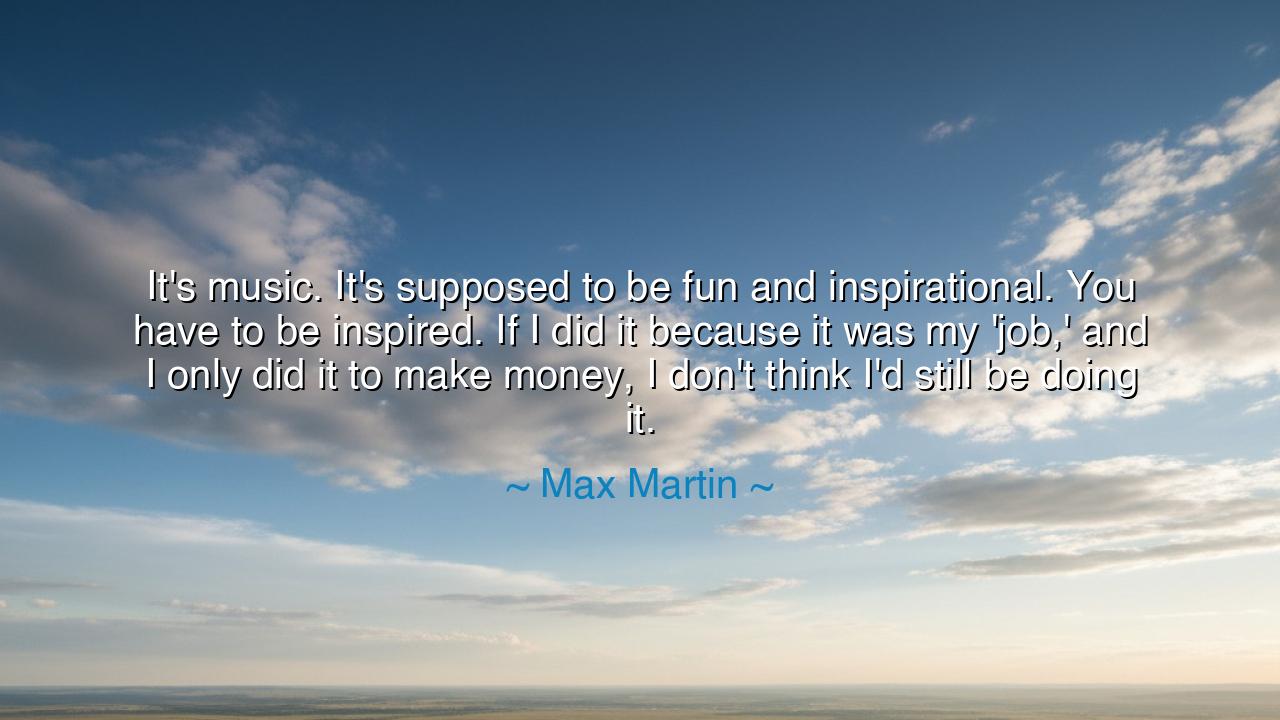
It's music. It's supposed to be fun and inspirational. You have
It's music. It's supposed to be fun and inspirational. You have to be inspired. If I did it because it was my 'job,' and I only did it to make money, I don't think I'd still be doing it.






In the clear and earnest words of Max Martin, we find a timeless truth about the nature of creation and the spirit of purpose: “It’s music. It’s supposed to be fun and inspirational. You have to be inspired. If I did it because it was my ‘job,’ and I only did it to make money, I don’t think I’d still be doing it.” These words, though spoken by one of the most successful songwriters of the modern age, carry the humility and wisdom of an artist who remembers why he began. Beneath their simplicity lies a profound philosophy — that joy, not ambition, is the lifeblood of art, and that to create without inspiration is to labor without soul.
The meaning of his words extends far beyond the realm of music. They speak to the ancient covenant between passion and purpose — the understanding that work born of love endures, while work born of obligation decays. For Max Martin, whose songs have touched generations and transcended borders, music is not a mere trade but a calling, a sacred dialogue between spirit and sound. When he says, “It’s supposed to be fun and inspirational,” he reminds us that music — and indeed all art — is not a burden but a blessing, a dance between heart and harmony. The moment it becomes a chore, its divine spark fades, and what remains is hollow craftsmanship, not creation.
The origin of such wisdom lies deep in the history of art itself. In ancient Greece, poets and musicians believed that inspiration — enthousiasmos, meaning “to be filled with the divine” — came not from the mind, but from the gods. To be inspired was literally to be possessed by something higher, something beyond oneself. The true artist did not force creation but received it with reverence, as one receives a sacred gift. In this light, Max Martin’s insistence on inspiration becomes not a modern sentiment, but a continuation of that ancient lineage. He, too, sees music as something sacred — not a machine for wealth, but a channel for wonder.
Consider the life of Johann Sebastian Bach, who, though a master of structure and discipline, wrote every composition with the inscription Soli Deo Gloria — “To the glory of God alone.” He understood that the secret to endurance in one’s craft was not in chasing applause or profit, but in staying faithful to purpose. Like Martin, Bach knew that to serve art as a job alone is to lose its essence. It is the joy of the work, the love of the melody, that sustains the artist through years and toil. Money may buy instruments, but only passion can make them sing.
Max Martin’s reflection also carries a quiet warning. “If I did it because it was my job… I don’t think I’d still be doing it.” Here he speaks to the soul of all who labor without love. The ancients taught that every person has a daemon, a guiding spirit or inner flame that reveals one’s truest path. To ignore that flame — to trade inspiration for obligation — is to betray oneself. The artist who creates only for profit soon finds his work lifeless; the worker who toils only for wage soon finds his spirit weary. But the one who finds joy in his craft, who lets inspiration fuel his effort, becomes eternal through his creation.
There is in these words also the echo of gratitude. Martin’s recognition that music must be “fun and inspirational” is a humble acknowledgment that he is both servant and steward of something greater than himself. It is the same humility that drove the builders of cathedrals, who labored not for glory but for grace, knowing they would never live to see their work completed. For every true craftsperson — whether composer, poet, teacher, or farmer — knows that passion is not luxury, but necessity. Without joy, the hands grow tired; without inspiration, the heart forgets why it beats.
Thus, let us draw from this wisdom a lesson for all ages: do what you love, and love what you do — or else your labor will consume you instead of completing you. Seek joy, not just reward. Let inspiration be your guide, for inspiration is the fire that turns work into worship. When you create, do so with wonder. When you work, do so with heart. When you live, remember that fulfillment comes not from the coins you earn, but from the music you make of your days.
And so, as Max Martin reminds us, whether we are musicians, builders, or dreamers, we must never forget the source of our craft: the spark that makes creation sacred. Work should not merely sustain the body; it should nourish the soul. For the one who remains inspired — who finds fun and purpose in what he does — will never tire, and his song, like the music of the ancients, will echo far beyond his lifetime.






AAdministratorAdministrator
Welcome, honored guests. Please leave a comment, we will respond soon